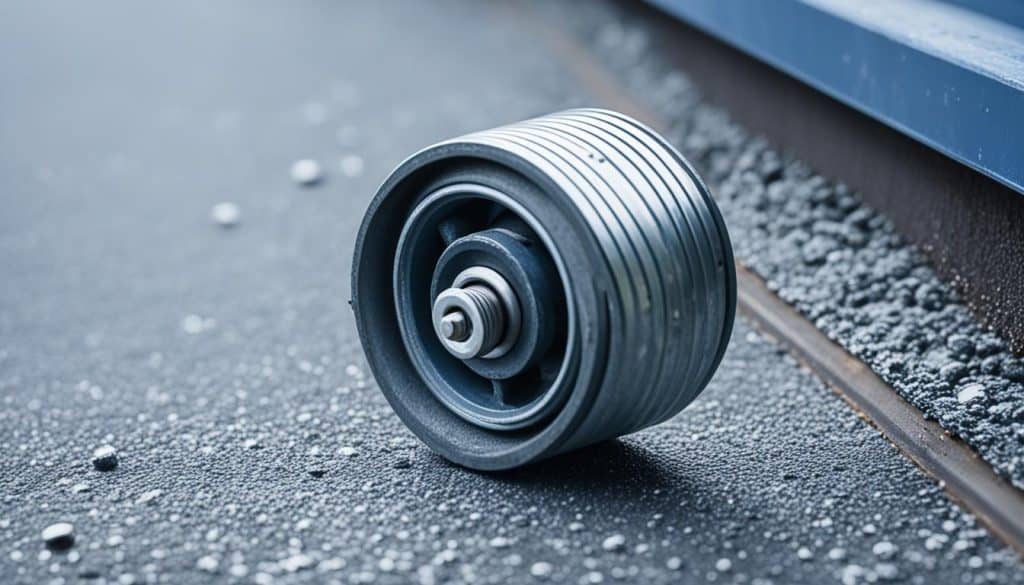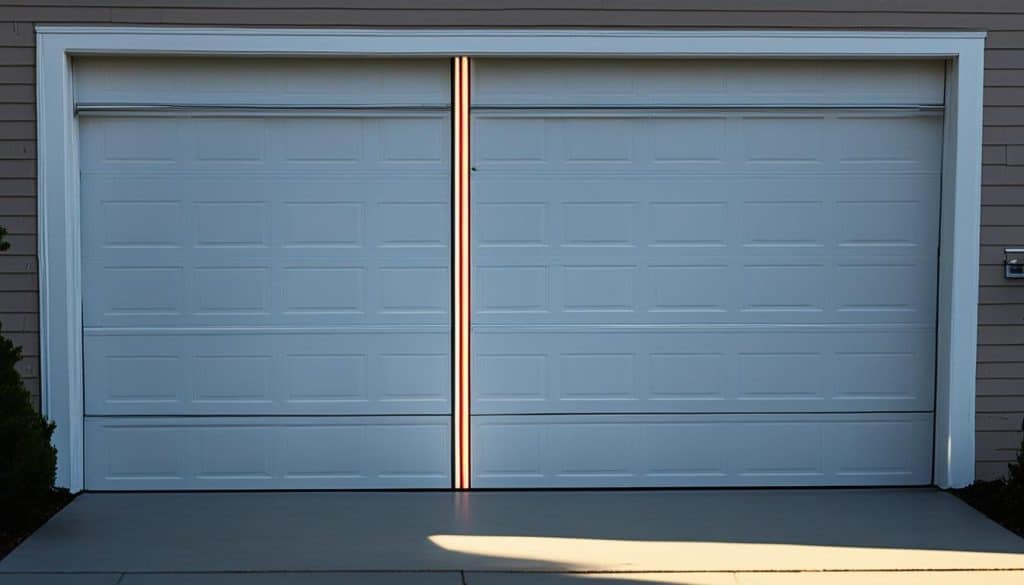Orlando Garage Door Services
1(407) 788-1229
Volusia Garage Door Services
1(386) 236-9100
1(407) 788-1229
1(386) 236-9100
Ever notice your garage door acting up right when you’re about to leave home? That squeak or refusal to budge isn’t just annoying; it can stop your entire day. Emerald Garage Door Services is ready to lend a hand. In this post, we’ll dive into problems you can spot, and we’ll show you easy fixes, too.
Typical issues like a snapped spring or bent track can lock up your garage quicker than you think. Don’t worry, we’ll walk you step by step through the repairs you can tackle this weekend. We’ll also highlight what problems are best left for the pros. To top it off, we’ll give you handy maintenance tips to keep the door moving smoothly and reminders to keep every family member safe when the door is moving.
Keep an eye on your door and follow safety tips to avoid any accidents.

When your garage door sticks and won’t open or close right, it could be simple to fix. One quick reason is that the door is out of balance, or a fuse has blown. To check the balance, switch off the door opener, lift the door a few feet, and let go. If it stays open or closed on its own, the balance is okay. If it drops or rises, the door isn’t balanced.
Next, look at the fuse. A blown fuse can stop the door’s motor and lead to the door staying put. Open the fuse box and check if any fuses look burnt or popped up. If you find one, replace it with a new fuse that has the same amps. Always be safe and turn off power to the box first.
If the balance is off or the fuse is okay and the door still acts up, it’s time to call a technician. They can look at the springs, tracks, or motor for you to get it running smoothly. Always be safe rather than take chances.
When your DIY repairs stall or don’t solve the problem, don’t hesitate to bring in a garage door pro. Techs spot trouble fast, fix it right, and know the tools needed to tackle the tricky jobs. With their help, your door glides up and down like it should in no time.
Garage doors that hesitate to fully open or completely close often have a hidden cause—blocked sensors. Take a few minutes to check for weeds, shrub branches, or lawn decorations that may have crept into the sensor path. Also sliding an old piece of cloth over the sensor antenna can help keep the dirt that weakens the signal from spoiling your movement. A clean and fully clear setup goes a long way. If the sensors look clear and the door still misbehaves, call a pro. They carry tools to reset or reposition sensors, restoring hassle-free access.
Springs keep the door balanced, and a cracked or stretched spring is a safety red flag. A spring that suddenly gives out can drop the door with dangerous speed—beneath can be cars and sometimes people. If the door is making strange noises as it moves up or down, signs of stretch, or bands of rust on the spring, a spring upgrade is a near must. Having a trained garage door technician replace springs not only keeps the system balanced but safeguards everyone who steps near the door.
If you suspect that your garage door springs are hurting, call a specialist right away. Don’t open or close the door until they arrive. Those springs are under heavy pressure, and only trained technicians should switch them out.
When the repair team arrives, pick a company that has a solid reputation in your area. They’ll choose the specific springs that match your door, so the repair goes smoothly and lasts longer.
Safety routines can’t be skipped when it comes to garage door springs. Techs should have their safety gear on, and pets or kids should stay far away. A quick flip of the garage door’s power switch keeps it from moving and keeps everyone safe.
You can slow the day the springs need to be replaced with regular care. A quick inspection, some lubricant in the right spots, and checking for tightness keeps them in good shape. But even with care, they do have a lifespan, so be ready.

When your garage door acts up, old or rusty rollers are often the problem. Over time, they gum up, and doors start to wobble or grind. A quick fix is to spray some garage door lubricant on the rollers. Give them a spin, and you might notice the door glides a lot smoother.
If a little grease doesn’t cut it, the rollers are probably too worn out. Most rollers last a few years, but it’s smart to check them for chips or dents. Replacing them is a simple and cheap fix that can get your door back on the track—literally.
Keeping the rollers clean and checked is a small job that prevents bigger headaches later. Slide them a little grease now and then, check for rust, and you’ll save yourself a lot of time and dough.
An opener that sounds sluggish or won’t respond at all can be a real stumper. Thankfully, the fix is often simple. The first step is to swap out the batteries in both the remote and the wall unit. Dead batteries are the number one reason openers won’t budge. Swap them and then hit the button. If the door sings back to you, rejoice in a quick win. If that doesn’t do it, check the power source to the unit itself or the safety sensors one more time.
Make sure you’re standing close to the opener. Low battery or distance can weaken the signal, and the door won’t respond. Move closer and give the button one more try.
Check the area around the door. Even small items can block the path and stop the door. Move any toys, boxes, or loose debris that might have accidentally fallen.
If your opener is old, overheats, or breaks often, consider upgrading. New models have extra safety and convenience features you’ll enjoy. A professional installer will wire, program, and test the unit for you.
An installer will sync the opener with the door and safety sensors. They’ll fine-tune the force and travel limits, so everything runs smoothly. That way, you won’t have to worry if the door is secure or the opener is malfunctioning.
By following these simple troubleshooting steps and calling a pro if you’re still stuck, you can keep your garage door operating smoothly. Always put safety first. If you have any doubts, reach out to an expert instead of guessing.
When your garage door suddenly starts making odd sounds, treat it like a warning light on your dashboard. The racket could come from a loose roller, a rusty hinge, or a cracked bracket. Even a loose chain, rattling nuts, and bolts can shut your peace down. The source might also be a spring or the door’s alignment, so best not to guess.
If your ears can’t pinpoint the noisemaker, the pros can. Garage pros have the gear and know-how to find the culprit in minutes—and afford you the peace of mind that the fix is right. When so many moving parts are in play, even a small slip can turn the door into a stereo injury if you go DIY.
Alongside the rattling, your door can develop other quirks. Some slide in half, others creep open so slowly you wonder if that’s even progress. Some refuse to respond to the remote or don’t recognize the keypad. Pros are trained to troubleshoot and guarantee the right fix the first go and not leave you guessing if the door might decide to reverse and crush your bike.
Taking the DIY road might seem like a money-saver, but a hack can easily cost you in repairs or worse, an injury. When your door starts talking or not behaving at all, a pro’s training keeps things running smoothly and securely. Don’t ignore the chatter; call the expert to give you peace and your door a proper check.
Garage door issues don’t have to ruin your day. Lots of glitches have quick fixes and, in most cases, a handy homeowner can tackle the job without drama. Armed with a few smart tips, lots of people can handle the little stuff while knowing the right moments to call in a pro for the big, tricky fixes. Safety first, always.
Regular upkeep is your first line of defense. A little oil, a quick wipe-down, and a quick once-over every now and then keep the door moving smoothly. Stick with a few easy steps and you’ll cut way down on the headaches down the line.
When the door keeps misbehaving and the fixes get complicated, skip the guesswork and call a technician. These folks have the tools and the know-how to get tricky repairs done without the stress. A pro job now keeps you from worrying later about safety and reliability.
Follow the tips, keep yourself out of harm’s way, and don’t hesitate to bring in the experts when the door deserves a master touch. Stick with this plan and your garage door will stay dependable, keeping your stress and your garage secure and safe every day.

Garage doors commonly struggle to open or close completely. Blocked sensors and broken springs are typical offenders. Rollers and opener malfunctions, strange sounds, and uneven alignment also pop up. Sluggish openings, a transmitter that doesn’t work, and keypad syncing issues are also frequently reported.
Start with a balance test: Lift the door about halfway and let it go. If it stays up, it’s properly balanced. Next, confirm that the main power supply is working. If the door is still stubborn, it’s time to call in a pro.
Inspect the sensors: make sure shrubs or anything else isn’t in the way. Give the lenses a gentle cleaning if they’re cloudy. If you’re still having trouble, a technician can sort it quickly.
Broken springs can snap with force and are a serious safety risk. Only a trained technician should replace them. Always observe safety guidelines when springs are in question.
Start by applying a garage door lubricant to each roller. If that doesn’t fix the problem, the rollers may have worn out and should be replaced.
Check and replace the batteries, then test the remote from a closer distance. Also, ensure the door’s safety sensors aren’t obstructed. If everything checks out and the opener is still acting up, a replacement unit may be the easiest fix. Hiring a pro guarantees proper installation.
Grinding, squealing, or banging noises usually signal an issue. Tighten any loose screws or bolts, and look for rusted rollers or worn-out hinges. If the sounds persist, a trained technician can pinpoint the exact problem before it leads to bigger repairs.
Uneven door movement, sluggish opening or closing, and unresponsive remotes or keypads are common complaints. A certified garage door technician can find the source of the issue and restore safe, smooth operation.
Staying on schedule with simple upkeep tasks helps your garage door run like a champ all year round. First, give all moving parts a friendly squirt of garage door lubricant every six months. Pull off dust, dirt, and stubborn bugs from tracks and photo-eye sensors. A toothbrush can work wonders on those tiny crevices!